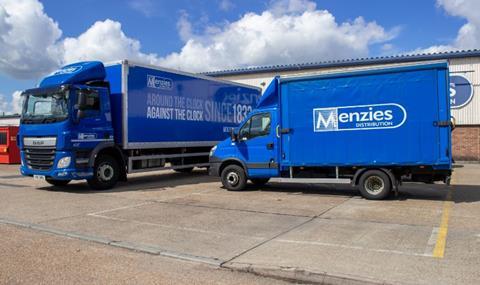
Menzies Distribution has revealed the contingency plans it is employing to deal with the coronavirus outbreak.
Commercial director Adam Smith said the health and safety of its employees remained the priority, along with keeping clear lines of communication open between suppliers and customers.
He also revealed that Menzies has appointed Albert Lovell as a “business continuity manager” to coordinate the company’s response to the outbreak.
Fomerly health and safety manager, Lovell has been tasked with overseeing and reacting to the impact of the virus across the entire business.
“We’re as on top of it as anybody can be,” Smith told motortransport.co.uk. “Can we predict the future? No, but we’re in as good a place as we can be to react quickly as the situation unfolds.
“Of paramount importance to us is our employees and customers. We’ve got a contingency plan, we’re following the government guidance and seeing where people are and where they’re not and we’ve done an audit on childcare and planning for eventualities should the schools close.
“It’s about practising good hygiene, having hand sanitizers on site and any contagion issues being resolved. If there are cases where people are feeling unwell we make sure they are sent home and isolate themselves where appropriate. That’s the key thing. It’s about the employees.
“Things of this type are within our contingency plans, but the unique nature of this, particularly around social distancing, is what we are now actively discussing and determining.”
Smith admitted there was “a danger we talk ourselves into challenges over time” but he said it was “incumbent on every business to do what they can in the short, medium and long term to maintain business going forward”.
“Everyone is coming together to try to solve this,” he continued. “We’re in daily conference calls with customers to review where they are, what their challenges are and how we can help each other. We’re making sure there’s consistency in approach.
“It is about working together at times like these. We have to be communicating and doing things in the right way to keep everyone safe and at the same time continuing to provide the service.”
Asked if panic buying was putting a strain on the company, which specialises in newstrade, parcel and retail deliveries, Smith said it was “all about managing the peaks and troughs” but the company had not felt it necessary to increase driver hours.
“Does it put a burden on us? Potentially," he said, "but it’s about working through that with our customers and planning appropriately.
“We are a 24/7 operation and we have the ability to flex that with customers. There’s enough flex in the network to encompass everything that needs to be encompassed at the moment.”
Smith went on to claim that Menzies had not been placed under any undue stress in terms of delivery: “We’re an operator, we’re a logistics company,” he said. “Our job is to deal with the problems on a day-to-day basis and it’s down to planning the routing and the dynamic nature of what we can do.
“We have workshops to keep vehicles on the road. It’s about keeping lines of communication open, whether that’s with suppliers, customers or employees. That’s the fundamental thing. We have a business continuity manager now and we are on daily calls with the senior leadership teams across the business. From that we take a view on how we move forward and what plans to put in place.”
Asked if the situation might be looked back on as a short-term panic, Smith said: “It may well be. Whether it’s short, medium or long term, I don’t know. I don’t think any of us really know. We have to take each day as it comes. We are predominantly a UK company so we only work within the bounds of the UK.
“I would hope the supply chain becomes fundamental in the next few weeks and months. Keeping the supply chain going and supporting that is the key thing, and planning and working with customers to ensure that happens.”













